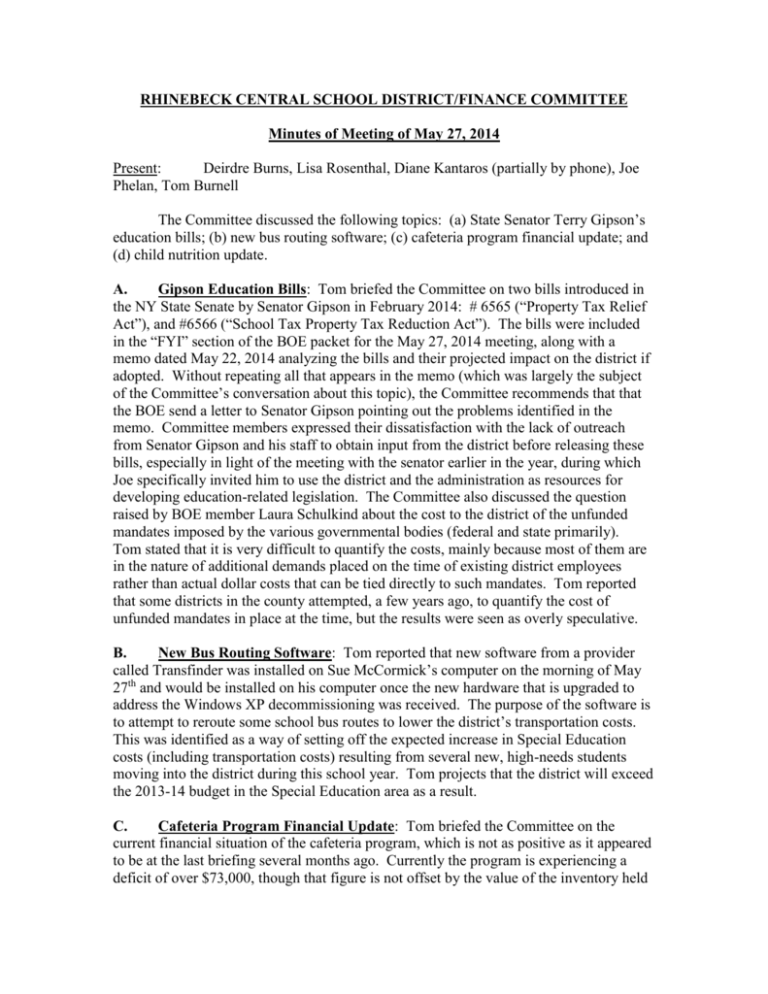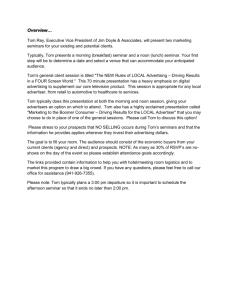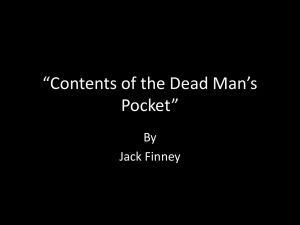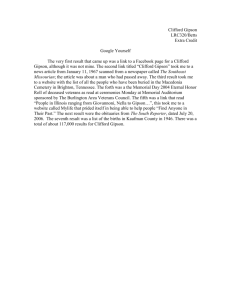Minutes - Rhinebeck Central School District
advertisement

RHINEBECK CENTRAL SCHOOL DISTRICT/FINANCE COMMITTEE Minutes of Meeting of May 27, 2014 Present: Deirdre Burns, Lisa Rosenthal, Diane Kantaros (partially by phone), Joe Phelan, Tom Burnell The Committee discussed the following topics: (a) State Senator Terry Gipson’s education bills; (b) new bus routing software; (c) cafeteria program financial update; and (d) child nutrition update. A. Gipson Education Bills: Tom briefed the Committee on two bills introduced in the NY State Senate by Senator Gipson in February 2014: # 6565 (“Property Tax Relief Act”), and #6566 (“School Tax Property Tax Reduction Act”). The bills were included in the “FYI” section of the BOE packet for the May 27, 2014 meeting, along with a memo dated May 22, 2014 analyzing the bills and their projected impact on the district if adopted. Without repeating all that appears in the memo (which was largely the subject of the Committee’s conversation about this topic), the Committee recommends that that the BOE send a letter to Senator Gipson pointing out the problems identified in the memo. Committee members expressed their dissatisfaction with the lack of outreach from Senator Gipson and his staff to obtain input from the district before releasing these bills, especially in light of the meeting with the senator earlier in the year, during which Joe specifically invited him to use the district and the administration as resources for developing education-related legislation. The Committee also discussed the question raised by BOE member Laura Schulkind about the cost to the district of the unfunded mandates imposed by the various governmental bodies (federal and state primarily). Tom stated that it is very difficult to quantify the costs, mainly because most of them are in the nature of additional demands placed on the time of existing district employees rather than actual dollar costs that can be tied directly to such mandates. Tom reported that some districts in the county attempted, a few years ago, to quantify the cost of unfunded mandates in place at the time, but the results were seen as overly speculative. B. New Bus Routing Software: Tom reported that new software from a provider called Transfinder was installed on Sue McCormick’s computer on the morning of May 27th and would be installed on his computer once the new hardware that is upgraded to address the Windows XP decommissioning was received. The purpose of the software is to attempt to reroute some school bus routes to lower the district’s transportation costs. This was identified as a way of setting off the expected increase in Special Education costs (including transportation costs) resulting from several new, high-needs students moving into the district during this school year. Tom projects that the district will exceed the 2013-14 budget in the Special Education area as a result. C. Cafeteria Program Financial Update: Tom briefed the Committee on the current financial situation of the cafeteria program, which is not as positive as it appeared to be at the last briefing several months ago. Currently the program is experiencing a deficit of over $73,000, though that figure is not offset by the value of the inventory held by the program. The next update will include that figure and should bring the deficit down somewhat, though it will not eliminate it. Tom also told us that he had been in contact with Isidoro (“Izzy”) Fattore, of Cognitive Cuisine, a company that offers various services to school districts and others seeking assistance with meal services. Cognitive Cuisine could provide consulting assistance, or take over the program entirely, or just provide meals it prepares to users in the district (the company specializes in “all scratch” cooking, without relying on packaged entrees or junk food). Mr. Fattore has also offered to meet with Tom and view the district’s program in operation, at no cost, and to make some suggestions on potential improvements. Tom also pointed out that the district’s food program would be changing soon based on the new federal nutritional requirements (discussed below). In terms of steps the district could take to reduce costs of the program, Tom believes that staffing may need to be reduced to do so, though exactly how to make such reductions is still being considered. It was suggested that the Committee explore the idea of hiring a consultant who could assist the district in developing a program that meets our financial and food quality needs. D. Child Nutrition Update: Tom provided the Committee with a printout of a PowerPoint presentation he received summarizing the new federal nutritional requirements for school meal programs. Highlights of the presentation were: (1) starting next year, the district will not need to charge the reduced-price to families not qualifying for free lunches, which would benefit those families but cost the district some lost revenues (it is not clear how much at this point); (2) the new requirements go into effect on July 1, 2014 and apply to all food sold from midnight through 30 minutes after the end of the school day, and all food sold includes food sold to staff; (3) all foods must be preportioned to comply with nutritional standards (which will be more time-consuming for the cafeteria staff and thus more costly); (4) no caffeine-containing products can be sold to anyone in the elementary or middle school in areas to which students have access (which, essentially, puts all areas of those schools off-limits for sale of caffeinated beverages including coffee); and (5) starting on July 1, 2015, all food service directors must be licensed, but there are not presently any licensing standards or procedures in place and, thus, the financial impact of this requirement is not clear. Next Regular Meeting: June 17, 2014 Dated: June 4, 2014 Respectfully submitted, Lisa Rosenthal 2








